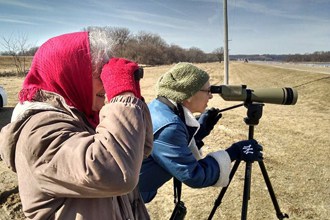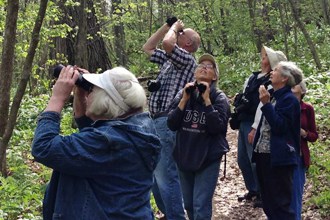Bird Watching Tips
- Pick a good place to go. Bird watching in different ecosystems (woodland, grassland, riparian, wetland) will allow you to observe more variety. Where two ecosystem types converge is often a good place to look, such as the edge of a woodland, or a marsh adjacent to a grassland. However birds can be observed anywhere, including your own backyard.
- Pick the right time of day. While birds can be observed any time of day, generally early to mid-morning is best.
- It is not necessary to wear camouflage clothing, but you should avoid loud flashy duds. Loose fitting comfortable layers work fine with the expectation that considerable time may be spent standing still.
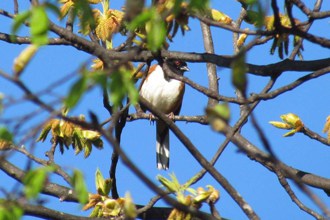
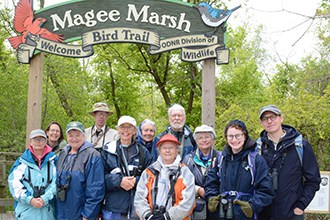
- Limit your movement and noise. Move slowly with frequent stops and keep conversation to only that which is necessary.
- Be patient! Sometimes birds are around and sometimes they aren’t. If they don’t seem to be in your area right now, they may be a half hour later, or perhaps tomorrow. Birds are highly mobile creatures. A few hours can make a big difference, especially during migration when birds move around a lot.
- If you are unable to identify a bird do not despair. Even the experts are sometimes baffled. Try to get as many clues as possible. The “six S’s” are a good guide for gathering clues (size, shape, shade, swoop, sound, surroundings). You will rarely get all six of these clues, but the more you have to go on the better the chance of identifying the bird.
- Don’t look in your field guide until you have gotten a good look at the bird and have as many clues as possible. Many people make the mistake of immediately consulting their field guide and when they try to get a second look at the bird, the bird is gone.
- Get yourself the best pair of binoculars you can afford. They will repay you with many great looks for many years. When shopping for binoculars it is best to hold them in your own hands, look through them with your own eyes, and talk with a knowledgeable sales rep. Avoid chain stores.
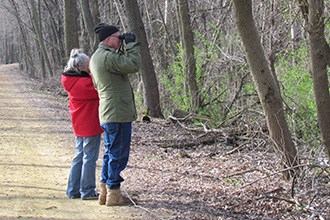
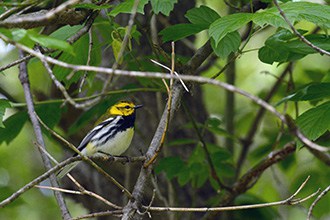
- Follow proper bird watching ethics. Respect private property. Respect other peoples’ activities. Respect the ecosystem. Refrain from disrupting birds while they are nesting or roosting.
- Don’t try to learn everything at once. Those who are most adept at identifying birds have been doing it for a while. The more time you spend in the field observing birds the better you will get.
- Invite a friend or family member to go along. The more people we can get interested in birds, the more people we can get concerned about bird habitat.
- Do anything and everything possible to preserve bird habitat. Habitat is the single most important thing that birds need to survive.
HAPPY BIRD WATCHING!
